It’s easy to fall into language traps. And, of course, there’s something to be said for the ever-changing nature of common terms and phrases. After all, the dictionary is a constantly evolving entity that adds phrases and words all the time to reflect common usage.
But that doesn’t mean you can’t at least strive for impeccable speech by understanding the best — or most commonly accepted — ways of saying certain words and phrases. Little tweaks in your language can help convey that you understand exactly what phrase you’re saying and that you’re using it properly. Plus, if you’re writing an email or typing a response — and let’s be honest, so much communication that happens these days happens online — you’ll stay on top of using the right spelling and phrasing.
Keep in mind, too, that in some of these common phrases, you won’t be able to hear the difference between the so-called “right” and “wrong” versions. And sometimes the “wrong” way to say something still has a perfectly legitimate meaning, even if it’s not the feeling you’re going for in that conversation.
Any advantage you can give yourself in the professional world, including the use of proper language and phrases, can be really beneficial in your life and career. So, we researched common words and phrases that people too often get wrong in case you want a quick refresher.
“For All Intensive purposes” vs. “For All Intents and Purposes”
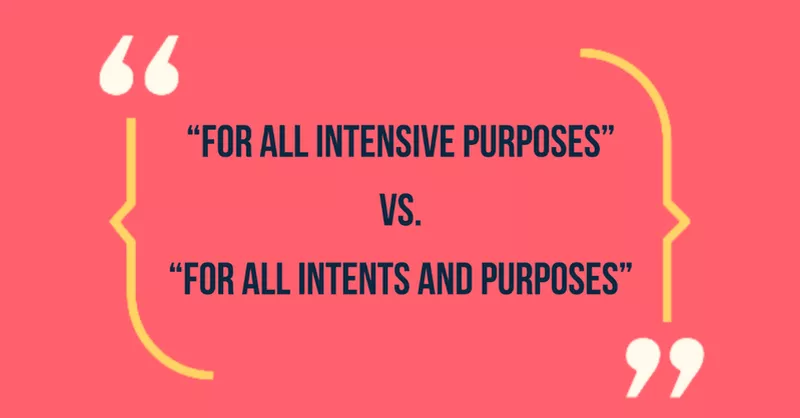
Intensive indicates that something is powerful and focused. If you’re discussing an intensive purpose, you’re simply indicating one focused purpose (or perhaps a few very focused purposes).
The more common phrase, for all intents and purposes, indicates that something is coming from more or less all important angles or opinions. So for all intents and purposes, all intensive purposes is usually the wrong thing to say.
“I Could Care Less” vs. “I Couldn’t Care Less”
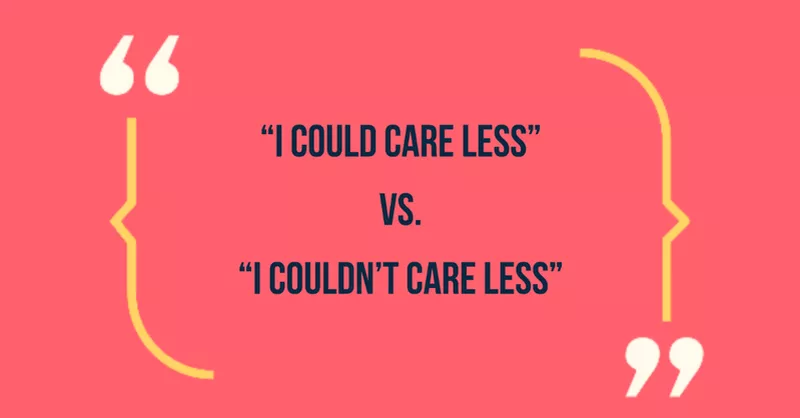
This is an extremely common misused phrase. While most people love to throw out that they “could care less” in an attempt to show how little they care about an issue, they’re actually communicating the opposite of the usual phrase’s intention.
When you stop to think about what you’re saying, “could care less” means you not only care, but you care enough that you would have the ability to care less if you wanted to. If you’re trying to convey apathy, saying “I couldn’t care less” is much more accurate.
“One in the Same” vs. “One and the Same”
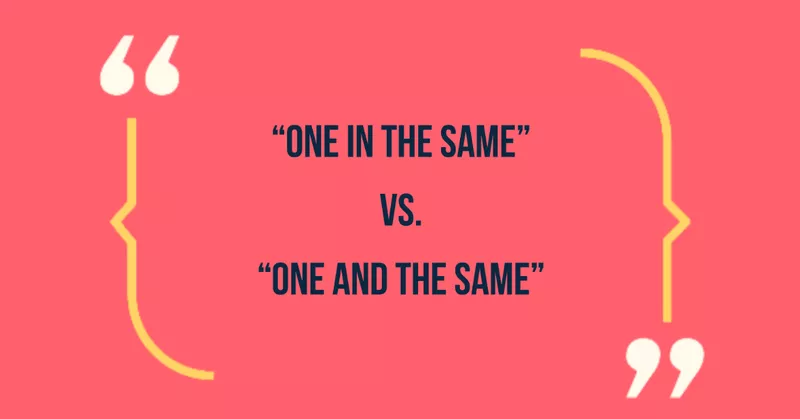
When you and a friend are discussing two different instances that you realize happened with the same person, you’re discussing one and the same person.
It’s hard to determine what one in the same thing might mean since “one” is a noun, yet “the same” isn’t exactly a specific location for that noun to go.
“On Accident” vs. “By Accident”
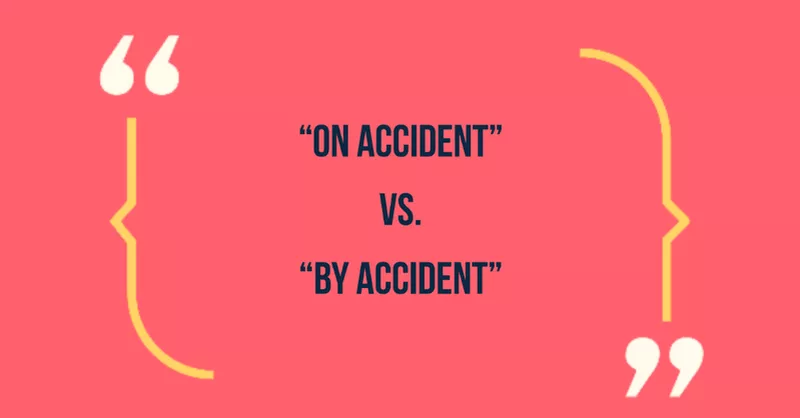
When something happens by accident, nobody saw it coming. It was a happenstance instance. But when something happens on an accident, it means that whatever went down actually went down on top of an already existing accident. And, in reality, that’s likely not what you were trying to say.
So, try not to say on accident by accident when you’re trying to describe a mistake since that will make it a double whoopsie.
“Fall by the Waste Side” vs. “Fall by the Wayside”
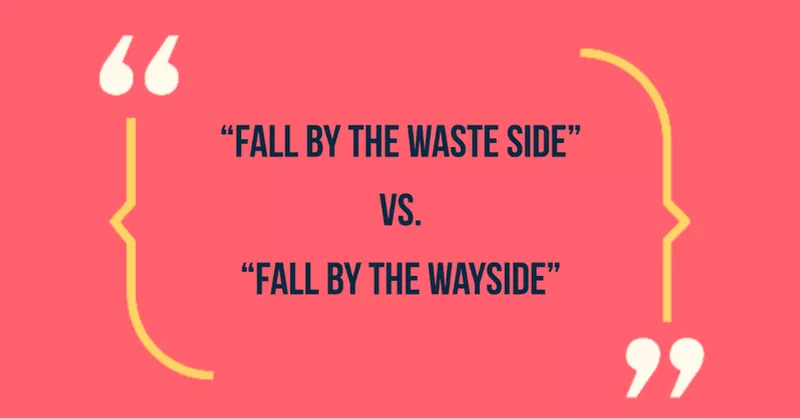
While the movie “Remember the Titans” made the left side of the football team’s defensive line the “strong side,” people rarely label “sides” in everyday life. Even more rarely, would they call any side of something the “waste side.” Unless, of course, they’re discussing an area where physical garbage is present.
So, if you want to communicate that something hasn’t kept up with the rest of the group, use “wayside.”
“Self-depreciating” vs. “Self-deprecating”
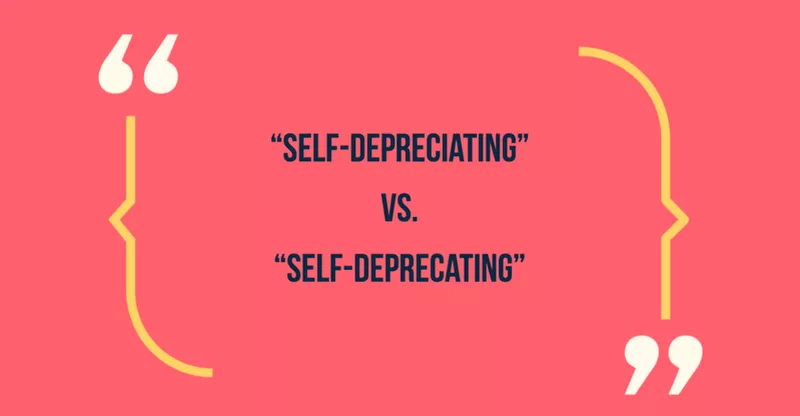
Don’t give yourself another reason to be self-deprecating about your colloquial abilities by using the incorrect phrase “self-depreciating.” Depreciation is an economic term to indicate that something is losing value.
Though you can deprecate and be hard on yourself, by pointing out your flaws, you’re not automatically losing any human value.
“Irregardless” vs. “Regardless”
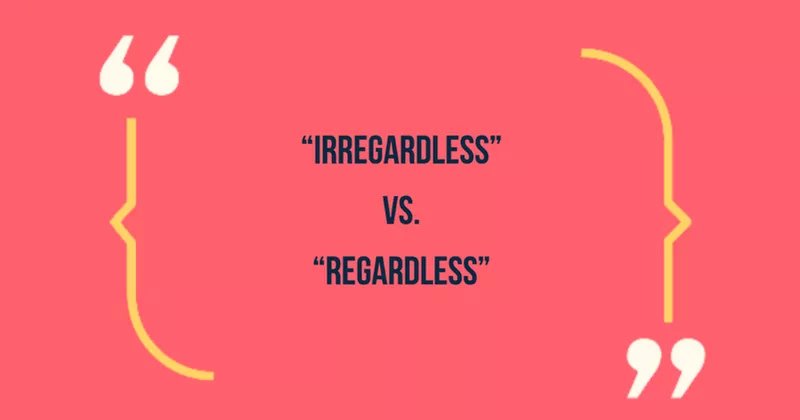
Despite the fact that irregardless is technically in the dictionary, it is not a word most folks will ever need. To be fair, the phrase “TL; DR” (which means ‘too long; didn’t read’ for any non-Redditors out there) is also in the dictionary. Sometimes, colloquial words or phrases are added to the dictionary to reflect the fact that people are using them and to help other people understand what they might be saying.
But irregardless remains rather nonsensical (and repetitive), regardless of its place in the dictionary.
“Jive With” vs. “Jibe With”
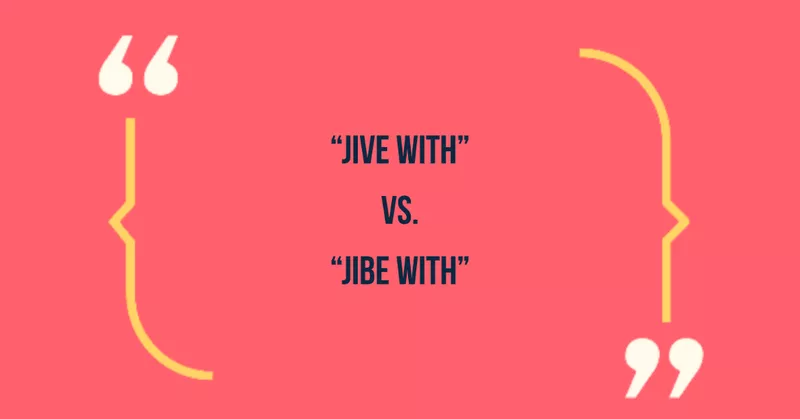
You’re more than welcome to jive with something. But just know that, at least in most business settings, you probably mean you jibe with it, not jive. To jive is a much more playful, often musical verb. But to jibe with something means you’re getting along with or understanding it.
To jive with something means you’re likely spitting hot scat in the basement of a musical jazz club. So, if that doesn’t jibe with what you’re trying to get across, don’t use it.
“Tongue and Cheek” vs. “Tongue in Cheek”
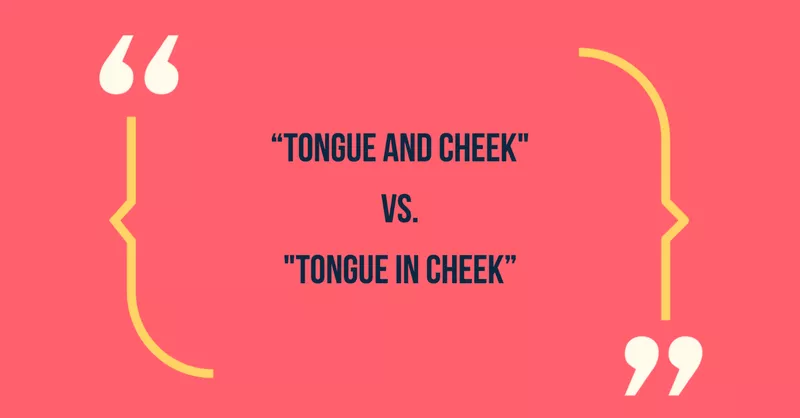
It may be tongue in cheek to try and get another person to say tongue and cheek, since you’ll be insincerely attempting to get someone to say something meaningless. When something is said tongue in cheek, there’s a feeling of exaggeration, sarcasm or irony involved.
When something is said tongue and cheek, well, it can really only mean that two facial organs were involved.
“Make Do” vs. “Make Due”
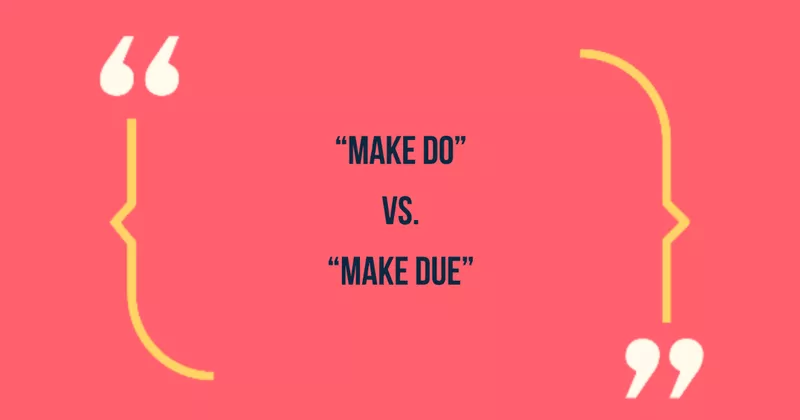
Both of these phrases are perfectly useful in different situations. If you want to make do with something, you’re getting by with whatever you have. Making due means creating a deadline or due date for something.
So, if an employer hasn’t made a specific project due and isn’t giving you the resources you need to do it properly, you make do with what you have and finish it whenever you want.
“Nip It in the Butt” vs. “Nip It in the Bud”
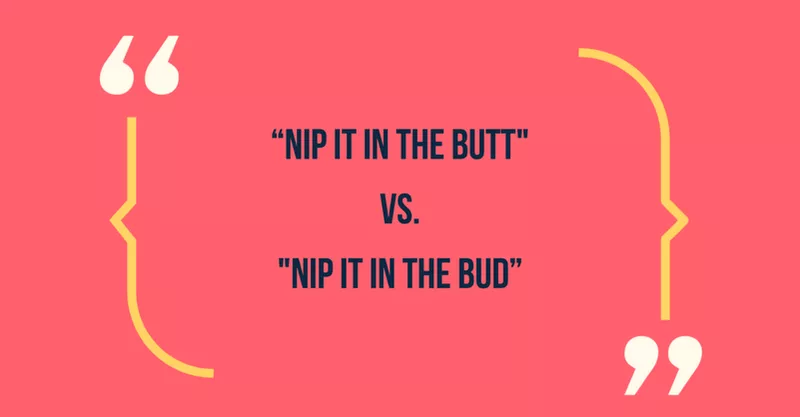
Let’s nip this commonly misused phrase in the bud right now. The origins of this phrase come from the idea of de-budding flowers. So, there were actual buds involved.
Think twice before you change that “bud” to a “butt” because you’ll be communicating something completely (and embarrassingly) different.
“Shoe-in” vs. “Shoo In”
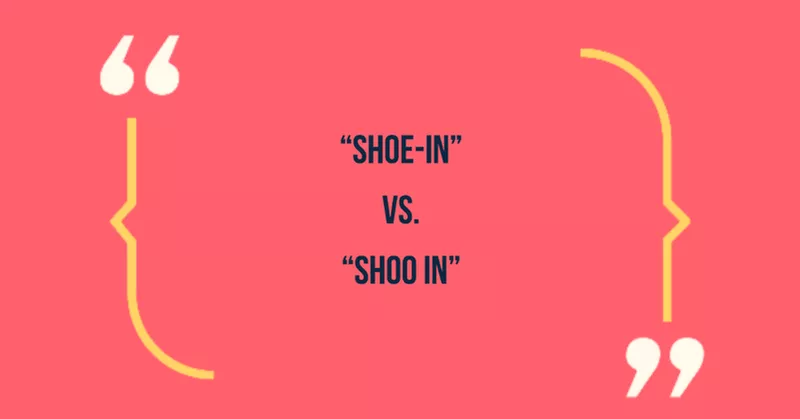
The difficult element of this phrase is that the wrong phrase (shoe-in) has a really powerful visualization that makes it feel right. To say that someone has a “shoe-in” to win feels like you’re trying to say they’ve already got their foot in the door (another common phrase).
The actual phrase is a “shoo in” and dates back to horse-racing days when you could urge — or shoo — something toward victory.
“Piece of Mind” vs. “Peace of Mind”
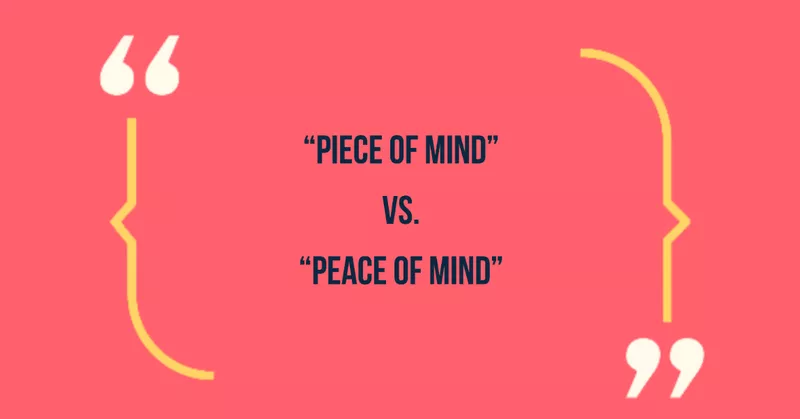
When you want to give yourself peace of mind, you might consider giving someone who upset you a piece of your mind. And though they’re said the same, their spelling indicates two very different meanings. Peace of mind is what comes when you know the conclusion or outcome of something, often indicating something positive has resulted. Piece of mind is sharing a bit of your own thoughts with another person, and is often done when someone has upset or frustrated you.
So, if you’re emailing your boss to give them peace of mind, be sure it doesn’t include an angry piece of your mind.
“Peek Interest” vs. “Peak Interest” vs. “Pique Interest”
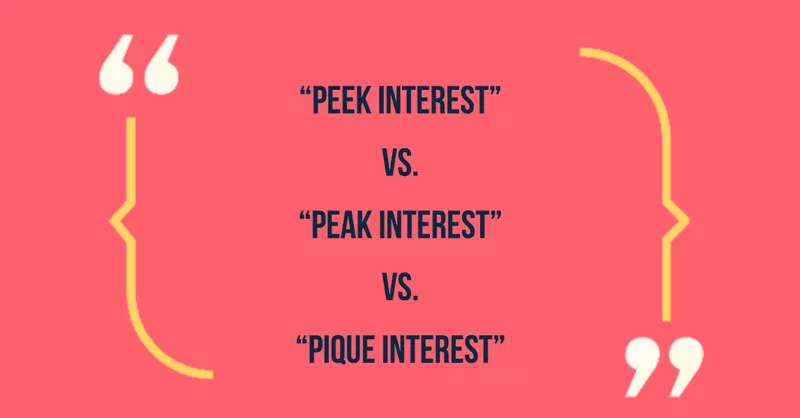
All three versions of this same-sounding phrase seem like they could work properly to indicate getting interested in something. But piqued actually means to excite or create interest or curiosity in.
So, sure, you could technically peek at something interesting if you’re sneaking around. And you could also have reached your peak level of interest in a topic before wanting to move on to something else. But in terms of something piquing your interest, be sure to use this version of the phrase.
“Do Good” vs. “Do Well”
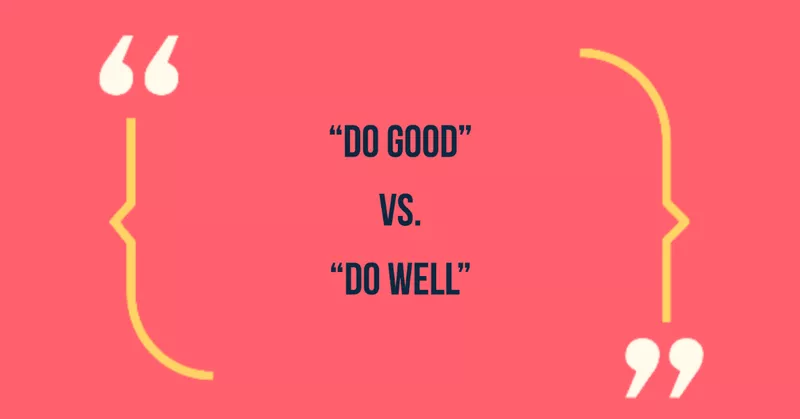
The good and well debate is one that grammar lovers enjoy getting into regularly. It employs all sorts of juicy discussions about using adverbs instead of adjectives.
To keep it simple, just remember that if you’re doing good, you’re likely giving generously to those around you. If you want to show that something was done properly or up to agreed-upon standards, it was done well. So, Mother Teresa did good. And she did her job well.
“Mute Point” vs. “Moot Point”
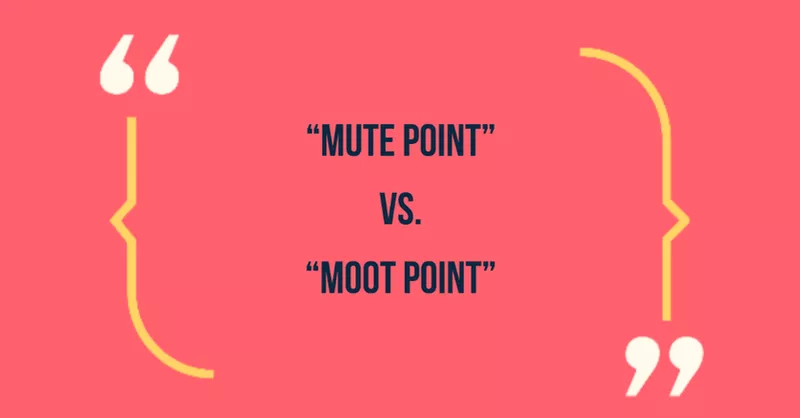
When you mute something, you render it silent. That’s why you can push the mute button on a remote. Yet when you decide something is a moot point, you make it irrelevant or subject to debate.
There is no “moot” button on a remote because it’s a much more philosophical — and less physical — action.
“Nerve-wrecking” vs. “Nerve-wracking”
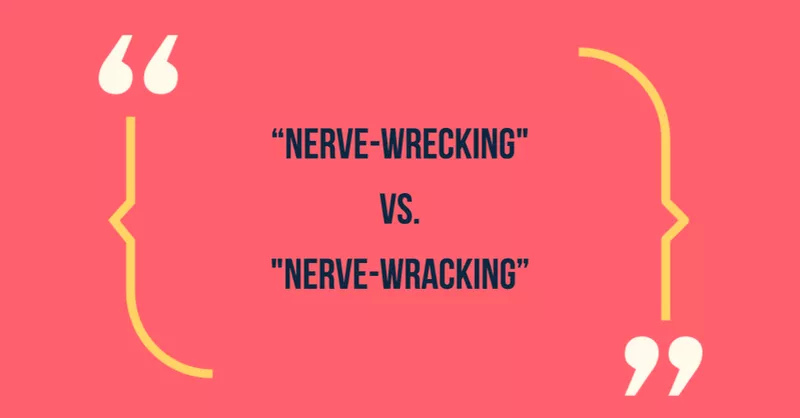
Trying to use the phrase nerve-wracking correctly can cause you to be a nervous wreck. Perhaps that’s why so many people jump to the conclusion that nerve-wrecking and nerve-wracking are the same things.
The proper way to say your nerves are standing on end is that the situation is nerve-wracking. You can also use nerve-racking since wracking and racking are essentially interchangeable.
“Buy in Large” vs. “By and Large”
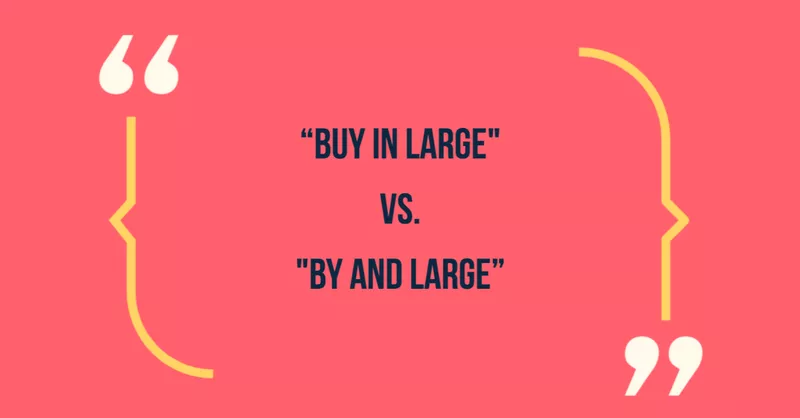
By and large is commonly credited as a sailing term. But in its original usage, it began as a phrase that means “in general,” “generally speaking” or something that gives you some idea of generality.
Buying in large is something you typically do when you buy in bulk at a wholesale store, like Costco.
“Proceed” vs. “Precede”
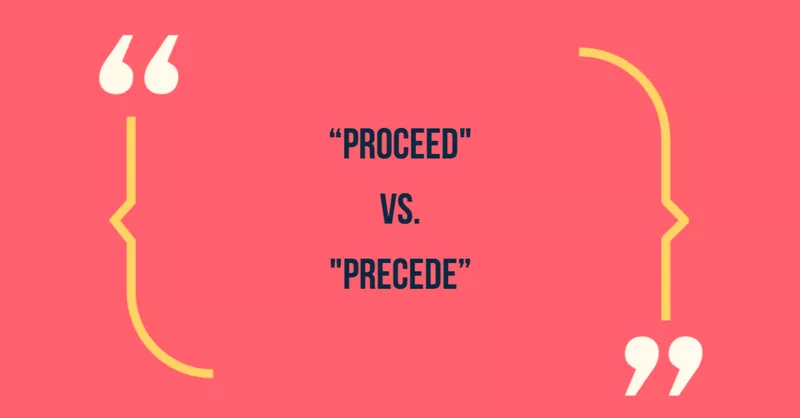
In this instance, both are legitimate words with perfectly useful meanings. But knowing the difference between them is integral to making sure your message is clear.
If you want someone to continue talking, you ask them to proceed. If you want to talk before someone, you’re going to precede them in speaking.
“Shade Light On” vs. “Shed Light On”
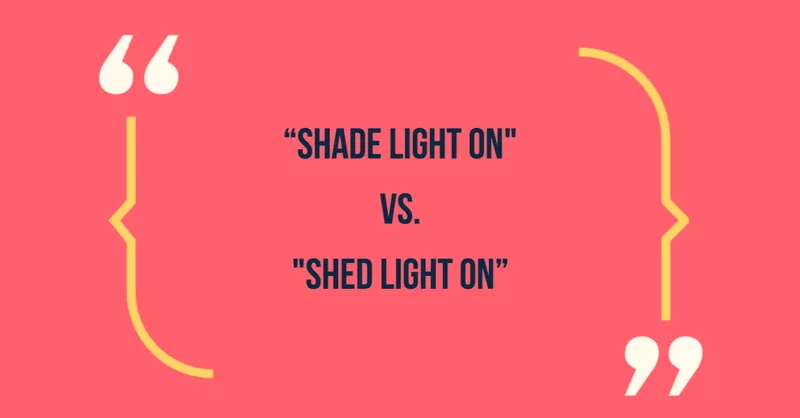
When you shed light on something, you bring it more clarity. It’d be interesting to learn how to shade light on something since shade hides light itself. You can shade light itself but to shade light on something maybe could mean you’re making it slightly more confusing (if you really wanted to keep using the phrase “shade light on.”)
Otherwise, if you want to denote that you’re bringing something more clarity, you want to shed light on it.
“Down the Pipe” vs. “Down the Pike”
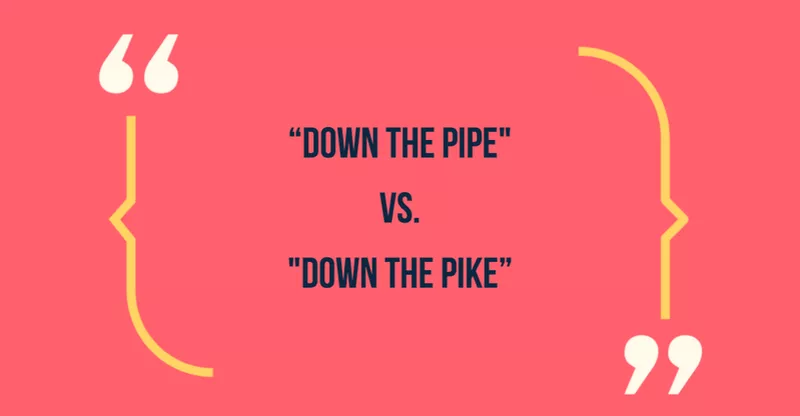
In Nintendo, Mario may travel down the pipe into new strange underground worlds. But in real life, something coming down the pipe simply means it’s actually traveling out of a pipe, theoretically, thanks to gravity.
The phrase down the pike comes from the idea of something coming down the turnpike and denotes that something is headed your way in the future.
“Doggie Dog” vs. “Dog Eat Dog”
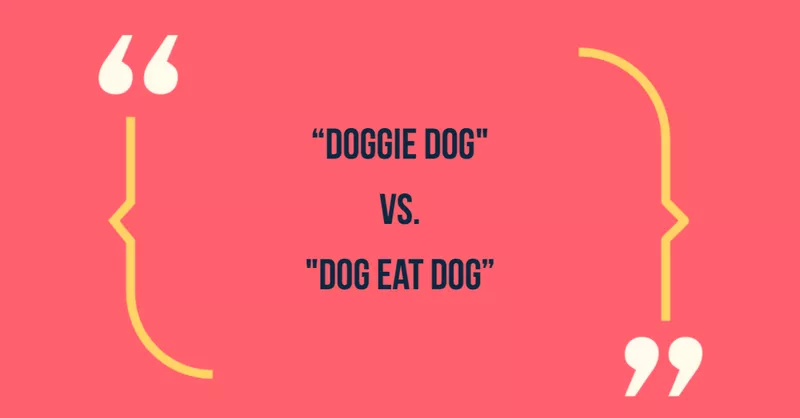
Doggie dog is an adorable description for your canine companion. Dog-eat-dog idiomatically means something is highly competitive or ruthless.
So, sometimes it can feel like a dog-eat-dog world, but at least we have adorable doggie dogs to cheer us up.
“Flush It Out” vs. “Flesh It Out”
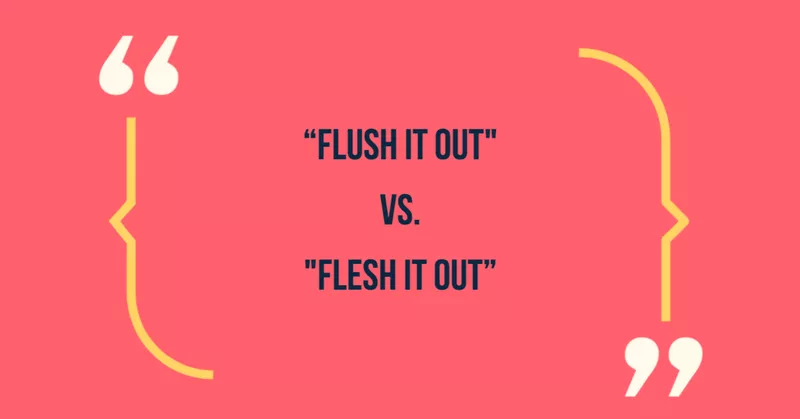
If you’re in a brainstorming meeting and you have a kernel of an idea, you and your team may want to flesh it out. That means slowly but surely creating a whole idea by layering structures upon each other.
But, say, in that same meeting there’s a small problem within the structure you already created, and you can’t yet pinpoint what it is, you want to flush it out. To remember which of these two similar-sounding phrases you want to use, just think of the visuals involved.
“Physical Year” vs. “Fiscal Year”
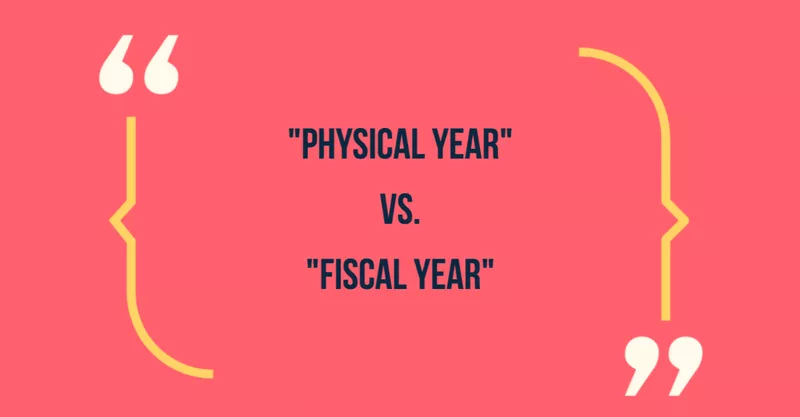
A physical year refers to the calendar year that helps everyone pass time in a universal manner. A fiscal year is a similar idea but only applied to finances.
While everyone celebrates the passage of time in the physical year, typically only business people — especially those involved in the financial realm like accountants — follow the passing of each fiscal year.
“Deep-seeded” vs. “Deep-seated”
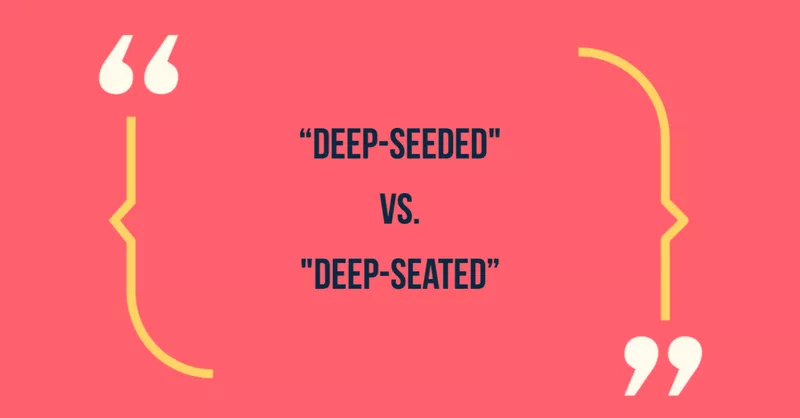
The most confusing part about these phrases is the fact that both of them have compelling visuals. If you plant a deep seed, you assume that it’s safe and will eventually make its way to the light. And the phrase “deep-seated,” which is technically the correct terminology, means something that feels buried deeply within an already existing structure.
So, while both totally make sense, if you really have a deep-seated need to be grammatically correct at all times, avoid using “deep-seeded.”
“Sneak Peak” vs. “Sneak Peek”
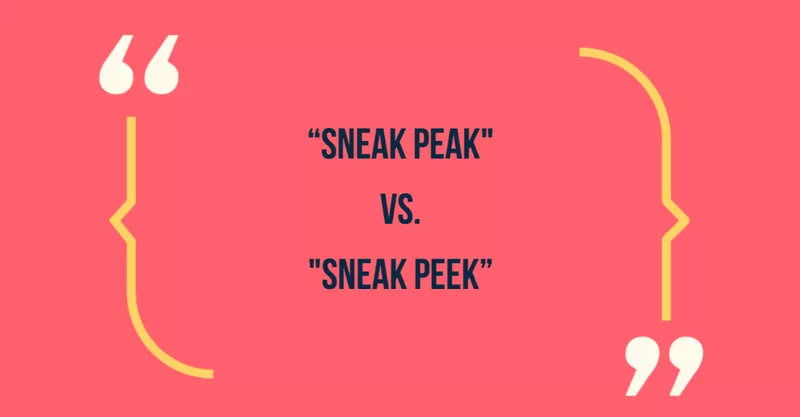
While these two phrases would be impossible to decipher in a verbal conversation, you’ll only ever want to write one of these if you want to be accurate.
A peak is a noun, describing the top of some physical place like a mountain. So, if you sneak a peak, you’re somehow slyly getting the top of a mountain into a surprising location, which doesn’t really make sense. The correct term is a sneak peek, which means you’re slyly giving someone the chance to quickly glimpse at something.
“Bemused” vs. “Amused”
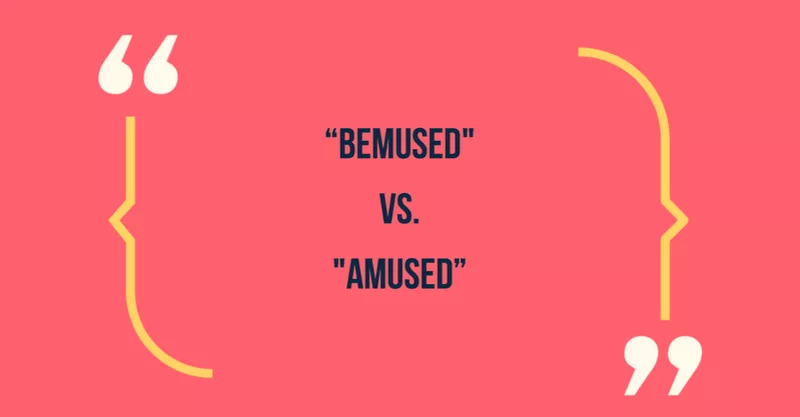
Though they both are descriptions of relatively dramatic emotions, they are on opposite ends of the feelings spectrum. To be bemused by something is to become bewildered by it. To be amused by something is to enjoy it.
So, if you go see a scary mystery movie, you’re choosing to possibly become temporarily bemused for the sake of being amused.
“Anyways” vs. “Anyway”
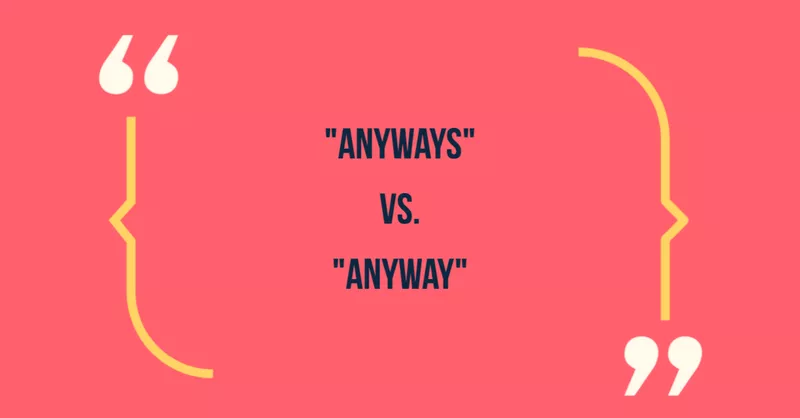
There is nothing wrong with saying anyways in casual conversation. But, adding an “s” to the end of anyway makes the conversation significantly more colloquial and relaxed.
If you’re in the middle of a professional presentation, consider dropping the “anyways” and keeping your speech crisp, clear and technically correct with “anyway.”
“Escape Goat” vs. “Scapegoat”
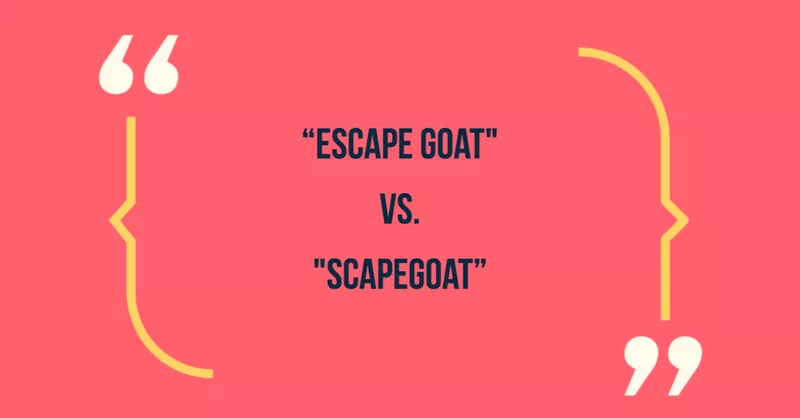
If you’re using a goat as transportation to escape from a situation you don’t want to be in, you could call that animal an escape goat, and you would be technically correct.
But if you’re looking to describe a person who is taking the brunt of the blame for some difficult or trying situation, you would call him or her a scapegoat.
“Without Further Adieu” vs. “Without Further Ado”
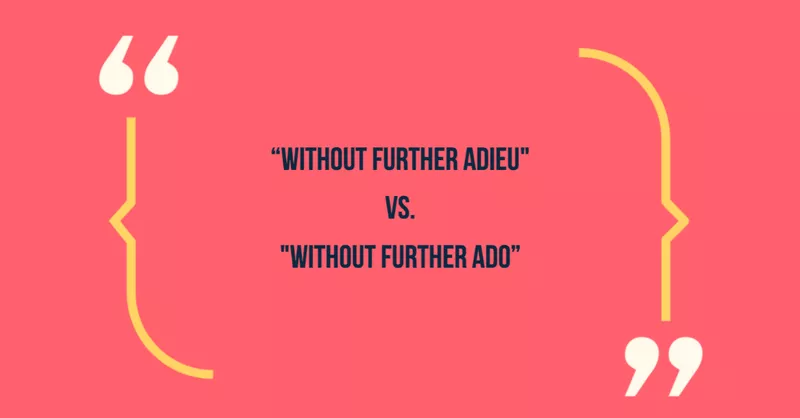
Adieu is when you bid someone a fancy farewell. Ado is a delightful phrase for hubbub, hullabaloo or fuss (which are all also really fun words). If you’re trying to say that you want to cut right to the heart of the matter, you want to get to it without further ado. If you want to end an interaction with some flair, you would say, “Adieu.”
Of course, if you’re in the middle of a bunch of people saying “adieu” to no end and you want it to be done, you could write “without further adieu.” Then again, you could also say “without further ado” and cover two birds with one stone.
“Step Foot” vs. “Set Foot”
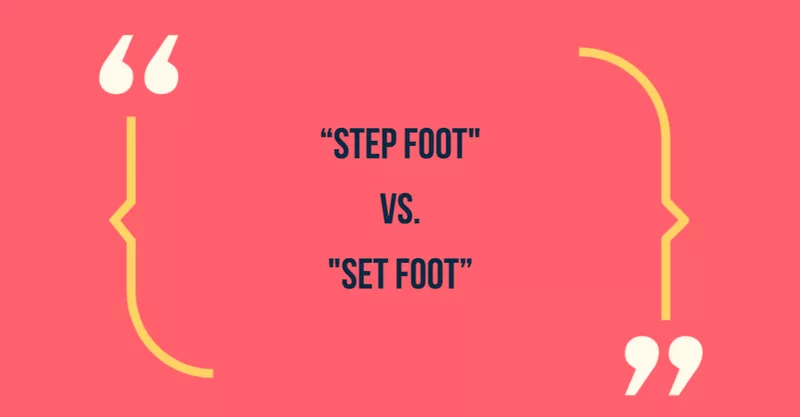
Both of these phrases have been around in our language for a very long time, and both are, more or less, interchangeable.
But the phrase “set foot” as in, “The minute I set foot in that room I want it to be ready,” is significantly more popular and, according to the Oxford English Dictionary, seems to be a couple of centuries older than its similar-sounding predecessor.
“Should Of” vs. “Should Have”
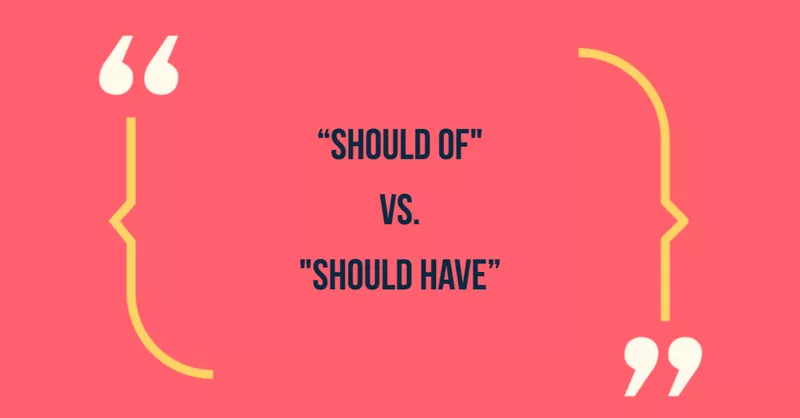
The biggest reason people often get these two phrases confused is because of the way “should have” contracts. The contraction of “should have” becomes “should’ve” which, if you say it quickly in everyday conversation, certainly sounds like “should of.”
And while maybe no one in your fantasy football league will hear the difference between “I should’ve traded my QB when I got the chance” and “I should of traded my QB when I got the chance,” in a more professional setting, you should always have the have in your correspondence.
“Try And” vs. “Try To”
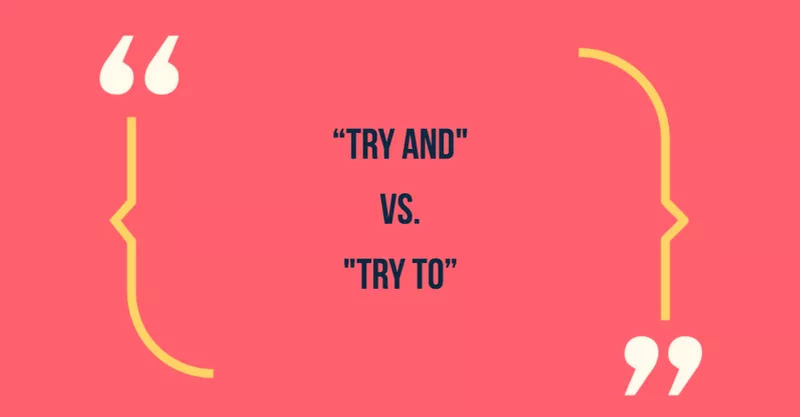
If you say, in everyday conversation, that you’re going to “try and do something,” the world will not end, and even the most stringent Grammar Police will likely let the phrase slide. It’s so common that people don’t even think twice about using the two phrases. But since we’re going to try to set the record straight about technical proper phrases, it should be noted that “try to” is grammatically correct.
When you try to do something, you’re attempting to move toward some stated goal. But when you try and do something, you’re trying and then doing something else. You can try and fail if you attempt to reach for something and fall short. Or you can try to fail if you purposefully want to not reach your stated goal.
“Beckon Call” vs. “Beck and Call”
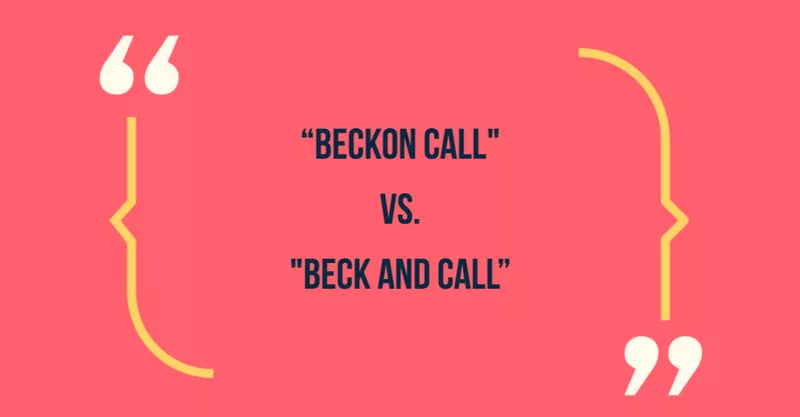
If you have a friend named Beckon and they dial you up, you can happily say you’re going to take this Beckon call knowing you are completely grammatically correct.
But if you want to say that you’re actively listening for an outside demand or request so you can fulfill it quickly, you’d want to say you were at someone’s beck and call.
“Hone In” vs. “Home In”
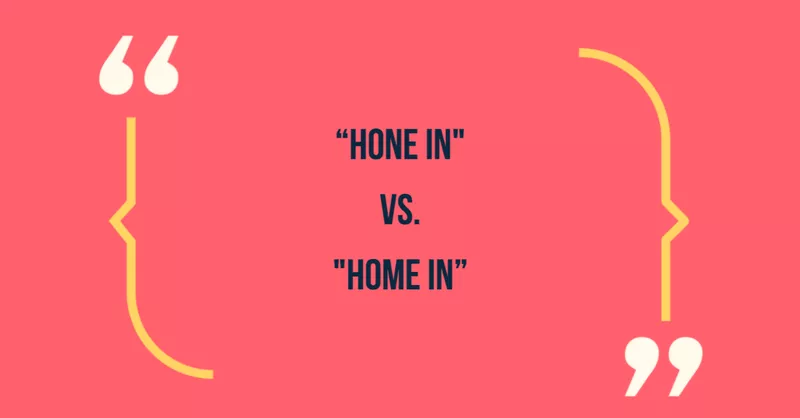
Like many of these examples, both of these are correct in their own way. But knowing the difference between the two extremely similar-sounding phrases will help make sure you are always nailing the proper meaning. When you hone in on something, you’re focusing in and, theoretically, becoming distinctly better at it — like a skill or trade.
But when you home in on something, you’re moving toward a larger goal or target. It’s easy to remember if you think about it when it comes to a specific goal. When you want to home in on your goal of becoming more musical, you’ll want to hone in your piano playing.
“Case and Point” vs. “Case in Point”
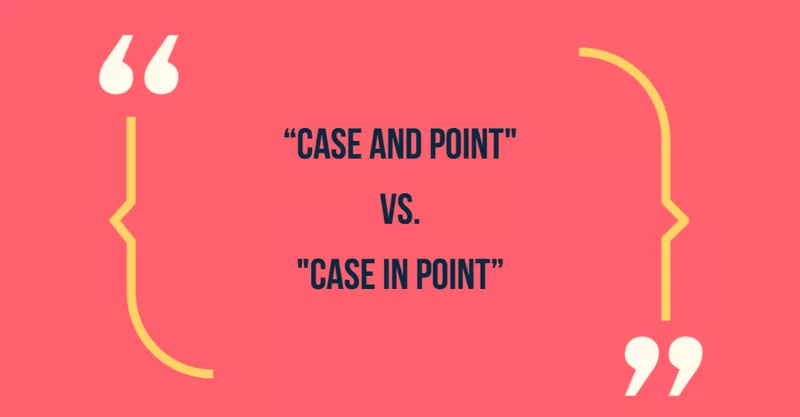
Likely derived from shortening the similar phrase, “in a point of fact,” case in point means you’re specifically focused on and calling out a matter at hand as an example to forward your argument. Using “and” to connect two words typically denotes that there are separate actions or ideas involved.
So, while it’s not wrong to say “case and point,” it may sound like you’re casing a place as if to size it up for a robbery and pointing at specific elements.